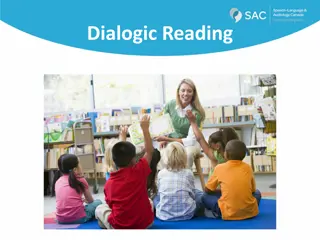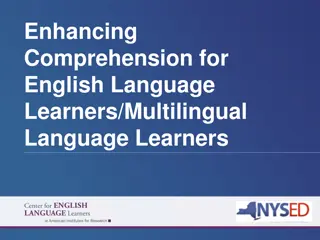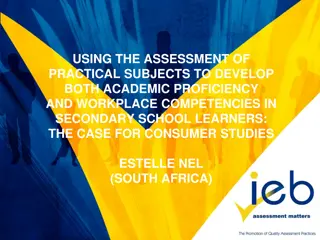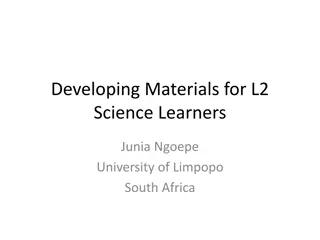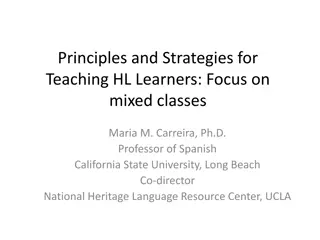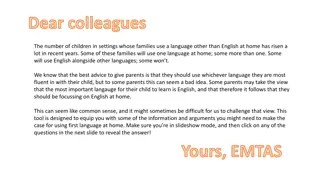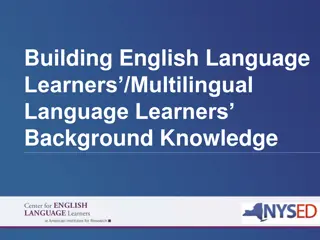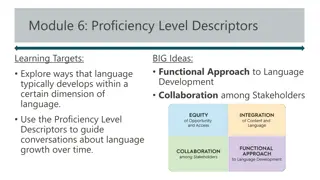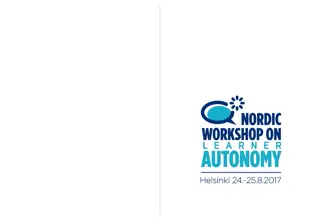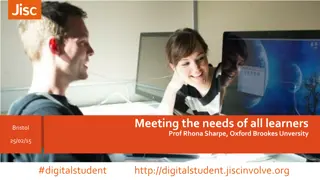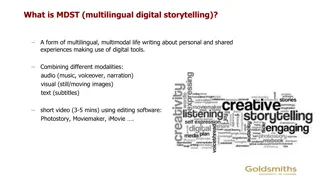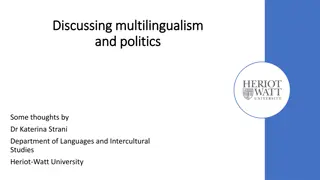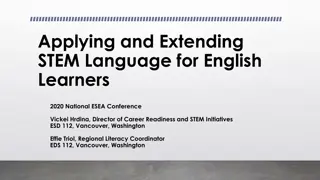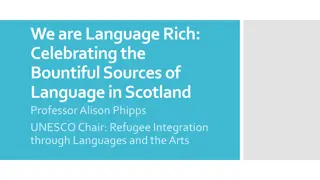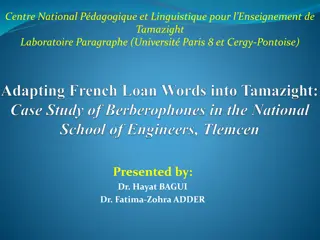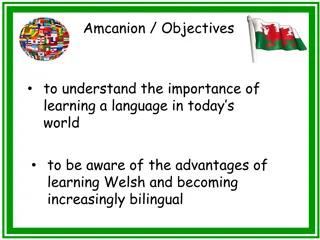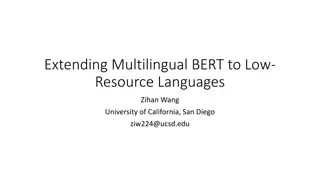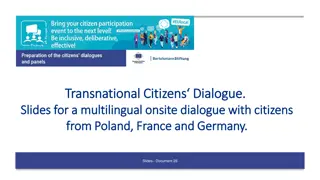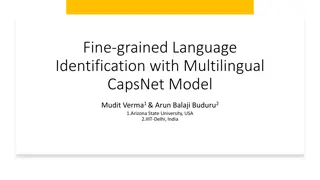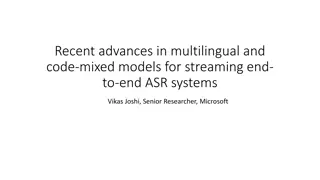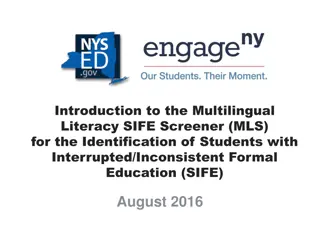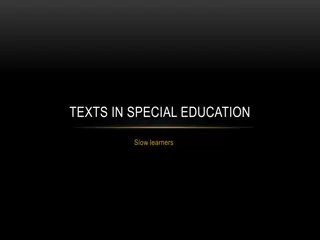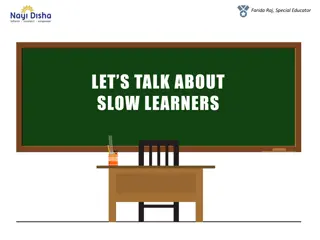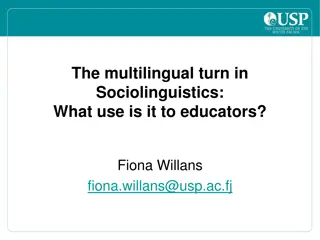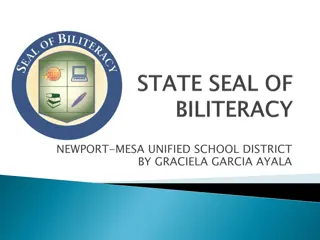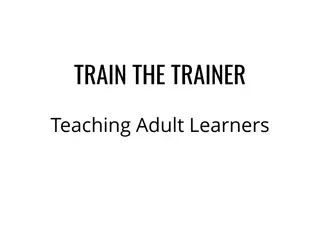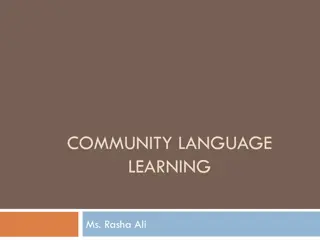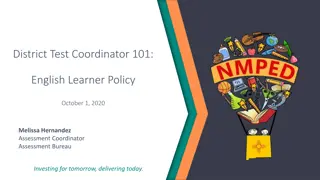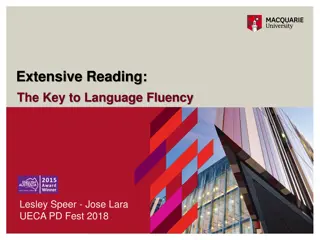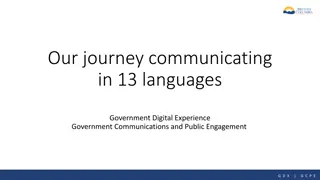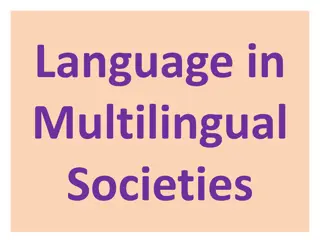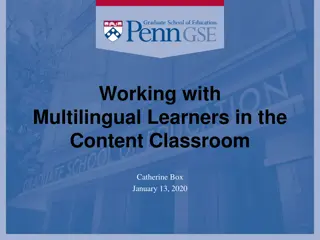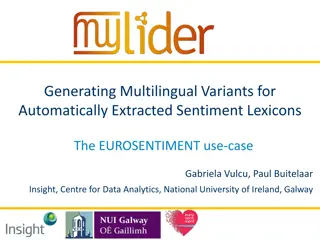Supporting Transitions for Autistic Learners in Scottish Education
This professional learning module focuses on supporting autistic learners in Scotland through effective transitions. Topics covered include terminology, the Scottish context for autism and inclusion, understanding autism, assessment and monitoring, supporting learners and families, social and emotio
0 views • 21 slides
Language Expectations and Functions in Educational Units
Explore the importance of unit language goals in educational settings, focusing on identifying language expectations, functions, and features. Understand how to describe language use for content learning and support multilingual learners. Examples from science and ELA units illustrate practical appl
8 views • 11 slides
Comprehensive Guide to Dialogic Reading for Language Development
Dialogic Reading is a systematic activity where an adult and child engage in shared reading, focusing on building oral language through interactive techniques like reading aloud, storytelling, and making connections with the child's experiences. This method enhances vocabulary, language skills, and
1 views • 26 slides
Enhancing Comprehension for English Language Learners/Multilingual Language Learners
This presentation focuses on scaffolding English language arts instruction to enhance comprehension for English Language Learners (ELLs) and Multilingual Language Learners (MLLs). It covers strategies like close reading, building background knowledge, and vocabulary development. The goal is to suppo
0 views • 73 slides
Enhancing Academic Proficiency and Workplace Competencies in Secondary School Learners through Consumer Studies Assessment
In South Africa, the National Senior Certificate (NSC) and the Independent Examinations Board (IEB) play crucial roles in assessing learners' academic proficiency and workplace competencies. Consumer Studies, as an elective subject, is integral in developing responsible consumer behavior and equippi
1 views • 23 slides
Supporting English Second Language Science Learners at University of Limpopo
Developing materials for L2 science learners at University of Limpopo to support previously disadvantaged English second language science learners. The program aims to help students succeed in Maths and Sciences, enabling more black students to enter science-based programs. Focus on improving Englis
3 views • 34 slides
Teaching Strategies for Heritage Language Learners in Mixed Classes
Explore essential concepts in teaching heritage language learners in mixed classes, focusing on project-based teaching. Understand the characteristics of native speakers, heritage speakers, and second language learners. Learn about the motivations of heritage language learners and the implications f
1 views • 48 slides
Speech and Language Developmental Milestones: A Bilingual/Multilingual Perspective
Speech and language developmental milestones are crucial for children, regardless of their home language. These milestones encompass receptive language, expressive language, pragmatics, and articulation and phonology. Understanding how a child hears and talks from birth to one year is essential, as
1 views • 23 slides
Supporting Multilingual Children in Early Years Settings
The number of children in settings with families using languages other than English has increased, raising questions about language use at home. Encouraging parents to use their most fluent language supports secure bonding, cognitive development, and speech skills. Growing up multilingual has variou
2 views • 8 slides
Effective Strategies for English Language Learners/Multilingual Learners
Welcome to the presentation series sponsored by the New York State Education Department Office of Bilingual Education and World Languages. This first presentation focuses on building background knowledge to support teachers in scaffolding English Language Arts instruction for ELLs/MLLs. Discover met
0 views • 43 slides
Language Development and Proficiency Level Descriptors in Educational Settings
Explore the Proficiency Level Descriptors and characteristics of language development in different dimensions, focusing on ways language evolves and the collaboration among stakeholders. Delve into how discourse progresses across the six proficiency levels and how teachers can utilize PLDs to suppor
0 views • 8 slides
Language Learner Autonomy Conference Programme Overview
The Language Learner Autonomy Conference spans three days full of insightful presentations, workshops, and discussions focusing on fostering learner autonomy in multilingual environments. The event includes diverse topics such as identity, social learning spaces, and empowering learners through embo
0 views • 14 slides
Meeting the Needs of All Learners in the Digital Environment in Further Education
Prof. Rhona Sharpe from Oxford Brookes University discusses how learners experience the digital environment in further education, highlighting the importance of meeting the diverse needs of learners. The content covers various aspects such as vocational backgrounds, prior educational/work experience
0 views • 13 slides
Engaging Young Minds Through Multilingual Digital Storytelling
Explore the world of multilingual digital storytelling, a creative way for children and young people to share personal and collective experiences using audio, visual, and text elements. This approach fosters collaboration, critical thinking, and creativity, with topics ranging from nature conservati
0 views • 8 slides
The Intersection of Multilingualism and Politics: Insights by Dr. Katerina Strani
Language plays a crucial role in shaping individual and collective identities, impacting attitudes, behavior, and culture. Multilingualism influences citizenship, defining belonging within society and determining rights and obligations. Examples of multilingual public spheres demonstrate the complex
0 views • 25 slides
Enhancing Language Learning in STEM Education for English Learners
Explore the importance of incorporating language skills in STEM education to support English learners. Gain insights on fostering multilingual skills, understanding STEM vocabulary, and promoting cultural competence in the learning environment. Enhance connections between language, science, and engi
0 views • 38 slides
Embracing Linguistic Diversity in Scotland: A Journey of Integration and Empowerment
Scotland celebrates its rich linguistic diversity through initiatives like the ESOL Strategy, promoting language skills for residents. Refugees are encouraged to learn and integrate, shifting language models from deficit to abundance, fostering a multilingual country with laws supporting Gaelic and
0 views • 11 slides
Multilingual Situation in Algeria: Influence of French Borrowings on Tamazight Varieties
The study conducted by the Centre National Pédagogique et Linguistique explores the intricate multilingual environment in Algeria, focusing on the incorporation of French borrowings in Algerian Arabic and Tamazight varieties. The research delves into factors leading Berber speakers to adopt French
0 views • 27 slides
Embracing the Power of Learning Welsh for a Multilingual Future
Discover the importance of language learning in today's global landscape and the advantages of becoming bilingual, with a focus on Welsh. Learning languages enhances cultural understanding, opens up new opportunities in travel, job prospects, and academic success, and fosters tolerance towards diver
0 views • 14 slides
Understanding Language Anxiety in Foreign Language Learning and Teaching
Explore the impact of language anxiety on students and teachers in foreign language learning and teaching contexts through insights from Dr. Christina Gkonou's research. Delve into the theoretical background, implications for language education, and real-life experiences shared at the Essex Language
0 views • 25 slides
The Value of Learning a Second Language and Career Opportunities
Exploring the significance of studying a second language, the benefits of being multilingual in the global marketplace, language choices at Willowmoore High School, considerations when choosing between Afrikaans and isiZulu, and the various career paths that revolve around language skills and profic
0 views • 7 slides
Extending Multilingual BERT to Low-Resource Languages
This study focuses on extending Multilingual BERT to low-resource languages through cross-lingual zero-shot transfer. It addresses the challenges of limited annotations and the absence of language models for low-resource languages. By proposing methods for knowledge transfer and vocabulary accommoda
0 views • 21 slides
Transnational Citizens Dialogue Slides: Multilingual Onsite Event from Poland, France, and Germany
Explore the transnational citizens' dialogue slides designed for a multilingual onsite event involving participants from Poland, France, and Germany. The presentation covers welcome sessions, program details, topics of discussion, and capturing citizens' opinions on Europe. Engage in a comprehensive
0 views • 16 slides
Fine-Grained Language Identification Using Multilingual CapsNet Model
This study explores fine-grained language identification through a multilingual CapsNet model, addressing challenges such as short audio snippets, multiple languages, noise, limited training data, and non-class identification. The dataset includes various languages like Arabic, Bengali, Chinese, Eng
0 views • 36 slides
Challenges and Advances in Multilingual and Code-Mixed ASR Systems
Recent advances in multilingual and code-mixed models for streaming end-to-end ASR systems present challenges including low resource Indic language data, multiple dialects, code-mixing, and noisy environments. These challenges impact ASR modeling by causing convergence issues, higher Word Error Rate
0 views • 34 slides
Multilingual Literacy SIFE Screener for Student Identification
The Multilingual Literacy SIFE Screener (MLS) is a crucial tool for identifying students with interrupted or inconsistent formal education (SIFE). This screener helps schools and districts in assessing students' literacy levels in their home languages, guiding appropriate program instructions. Vario
0 views • 22 slides
Understanding Slow Learners in Special Education
Slow learners are individuals who take longer to grasp concepts and struggle with traditional academic demands. They are not disabled but may lack interest in conventional educational systems. It is important not to confuse slow learners with students needing special education or those who are non-c
0 views • 4 slides
Understanding Slow Learners: Characteristics, Signs, and Support Strategies
Learn about slow learners through the perspective of Farida Raj, a special educator. Discover the characteristics and signs of slow learners, such as difficulties in grasping abstract concepts, poor self-image, and slow task completion. Find out how to spot the signs and provide necessary support th
0 views • 14 slides
The Multilingual Turn in Sociolinguistics: Implications for Educators
Exploring the multilingual context in Vanuatu, this article delves into the historical evolution of language policies and their impact on education. It discusses the diverse language landscape in Vanuatu, the challenges faced by educators, and the shifting paradigms in language instruction over time
0 views • 27 slides
Multilingual Education Program at Newport-Mesa Unified School District
In response to new educational reforms, Newport-Mesa Unified School District is enhancing its language programs to prepare students for a multilingual world. With a focus on promoting diversity, encouraging the study of world languages, and fostering respect for other cultures, the district aims to
0 views • 13 slides
Understanding Learner Styles and Strategies
Learner styles and strategies play a crucial role in education. There are two main types of learners - Analytic Learners who focus on details first, and Holistic Learners who prefer understanding the whole concept. Analytical learners excel at recalling facts, excel in math and science, and are good
0 views • 37 slides
Understanding Adult Learners: Key Characteristics and Strategies
Characteristics of adult learners include being goal-oriented, self-directed, valuing past experiences, desiring respect, and having established habits and opinions. Understanding these traits is essential for effective teaching and training. Adult learners seek practical information, immediate feed
0 views • 47 slides
Effective Community Language Learning Method by Ms. Rasha Ali
Community Language Learning (CLL) method emphasizes understanding students' feelings and creating a supportive environment for language learning. This approach, influenced by the Counseling-Learning approach, focuses on building relationships, reducing anxiety, and promoting effective communication
1 views • 15 slides
Supporting English Language Learners in Education: Key Guidelines and Tools
Federal laws protect English learners under Title VI of the 1964 Civil Rights Act and the Equal Educational Opportunities Act of 1974. The New Mexico LUS must be completed for all new students enrolling in public schools to identify English language learners. Utilizing tools like W-APT and WIDA Scre
0 views • 21 slides
Exploring the Importance of Extensive Reading for Language Fluency
Extensive reading plays a crucial role in language fluency development. It involves reading easy and enjoyable material at a faster pace, allowing learners to choose what they want to read. By following ten principles and a four-strands approach, extensive reading helps improve four essential langua
2 views • 14 slides
Multilingual Government Digital Communication Project for COVID-19 Response
This project, funded by the Ministry of Health, focuses on multilingual communication for COVID-19 response. It includes translating PHO orders, health safety information, vaccination details, and economic recovery resources into multiple languages to ensure accessibility and understanding for all c
0 views • 14 slides
Language in Multilingual Societies: Embracing Diversity
In multilingual societies, people navigate daily life using multiple languages for various purposes. From home to work to prayer, different languages play a crucial role in communication and social organization. The interaction of speakers of multiple languages in such environments can lead to langu
0 views • 22 slides
Supporting Multilingual Learners in the Content Classroom
Explore different strategies and resources for working with multilingual learners in the content classroom. Discover ways to differentiate instruction, support academic language development, and address the needs of gifted students and those with IEPs. Aim to challenge students in their learning zon
0 views • 27 slides
Factors Influencing Language Acquisition in Learners
Factors such as affect, motivation, self-confidence, anxiety, and attitude play crucial roles in language learners' acquisition process. High motivation, self-confidence, and low anxiety levels enhance effective language acquisition, while positive attitudes towards learning facilitate seeking and p
0 views • 10 slides
Multilingual Sentiment Analysis for Enhanced Language Resources
This presentation discusses the EUROSENTIMENT project focusing on generating multilingual variants for sentiment lexicons. Addressing challenges in sentiment analysis, the project aims to build a shared language resource pool to improve adaptability and interoperability of language resources. Object
0 views • 36 slides


